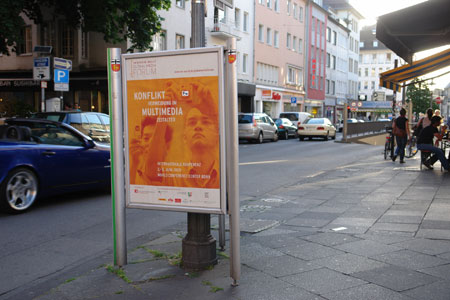
Once the capital of West Germany, the city of Bonn appears unexpectedly modest and tranquil today. However, some converted official buildings and the placards reminding of the 60th anniversary of the Federal Republic do actually bring back the city’s important steps in Germany’s democratic history.
Despite its apparent modesty, what Bonn represents today is a perfect conference city. Exempli gratia, more than 4,000 participants are meeting these days in Bonn for the Climate Change Talks.
These talks are taking place very close to the World Conference Centre, hosting the 1500 participants that have registered for this year’s Global Media Forum. (Just as a side note: I was told by one of the organizers that 1500 will unfortunately not be the real number of participants. Numerous registrations from African countries were more of the fictive kind, since visas were only accorded to the very few.)
My first insightful encounter was with the people from U-Media, a Ukranian Internews project. Internews is an NGO fighting for the independence of information by empowering local media. As for U-Media, its goal is to develop a more robust media sector that works to serve the interests of independent media in the Ukraine.
U-Media staff explained how difficult it is to attain such a goal in country whose economy is about to fall. And yes, the good news is that bad media – as they call it – is disappearing. But the bulk of the biased media is not – it remains in the hands of oligarchs. As for the support of new media, it is very hard for U-Media to make its way through in a country with an internet penetration of only 22% (you can compare it to the 53.9% in the neighboring EU member country Romania.)
Like the USAID-sponsored Intermedia, the Thomson Foundation trains and supports journalists throughout the world. With the Thomson Foundation representative I discussed the case of Mizzima.com, the New Delhi based news agency run by Burmese people in exile offering coverage on the country. A Deutsche Welle reporter for Hindi told us about his idea of India supporting Mizzima to establish a rebel radio for Burma.
Many ideas in the air, as you can see. Looking forward to the conference itself and to more encounters tomorrow.
